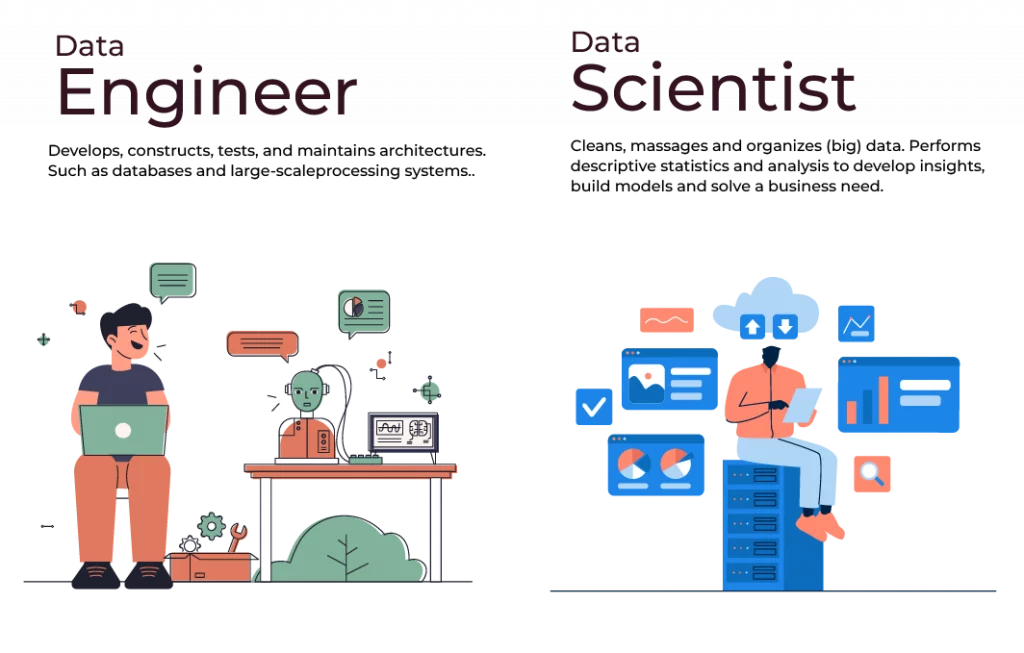In today’s world, data science can be considered one of the most popular and promising branches, whose development has contributed to the growth of Big Data and the necessity of data-based decision-making. The LinkedIn 2021 Emerging Jobs Report shows that data science positions increased by 37% yearly. Such an increase only underlines the fundamental importance of data science in a wide range of sectors, including IT, pharmaceuticals, banking, and grocery stores. As companies try to institute Analytics and leverage big data for competitive advantage, the value of data scientists has not been undermined.
This comprehensive tutorial describes the roles of data scientists and data engineers in the data science discipline. We will discuss their major duties, their typical salary, the educational levels they often need, and the types of jobs they may be able to find. Whether you want to become a data scientist who solves data analysis problems or a data engineer who creates effective data architectures, this guide will connect you to the information you need in the constantly evolving data science job landscape.

Is there any difference between a Data Engineer and a Data Scientist?
Data Scientists had to play the role of Data Engineers on certain days. However, the responsibility of the data field has been segmented with the expansion and evolution of the data, complicatedness in the data collecting and management field, and actual expectations from the organizations by the deep searching of the data.
The main difference in this unique domain is that data engineers design and maintain frameworks and systems that store, extract, and organize data. However, data scientists analyze large amounts of data to determine trends, extract in-depth business details, and determine the correct questions for the company.

POSTGRADUATE PROGRAM IN
Data Science & AIML
Learn Data Science, AI & ML to turn raw data into powerful, predictive insights.
Data Engineer vs Data Scientist
Though Data Engineers and Data Scientists share some common skill sets and, ironically, have to handle data engineering tasks in some cases, in some cases, these two roles are distinguished.
Roles and Responsibilities
The advantage of working together is having data engineers in a data science role and vice versa. Data Engineers create and refine the framework so that data scientists can complete tasks and start , making sense of the enormous amounts of data Data Engineers have to deal with.
What Does a Data Engineer Do?
A data Engineer is someone who prepares the data infrastructure for analysis. They’re interested in data readiness to produce raw data, including format, scaling, data storage, resilience, and security. Tasks given to data engineers include designing, building, testing, tackling, and optimizing data from many sources. They also further develop the infrastructure and the architectures, allowing data generation. The first is to lay the foundation for easy-to-set-up data pipelines with an arsenal of heavy data technologies for real-time analytics. On top of that, data engineers also formulate complex queries to ensure easy access to data.
What Does a Data Scientist Do?
Data scientists emphasize decoding novel insights within prepared data, which engineers usually handle. Their responsibilities include conducting online experiments, formulating hypotheses, and utilizing expertise in statistics, data analytics, data visualization, and machine learning algorithms to discern patterns and generate business forecasts.
In addition, Data Scientists collaborate with business leaders to understand specific requirements. They present intricate findings in audio and video formats customized for a general business audience.
The image below illustrates what this means in terms of concentrating on the data science workflow’s steps:

Data Engineering vs Data Science- Education and Qualifications
People in data engineering and data science hold at least a bachelor’s degree in computer science or a related field, such as economics, statistics, mathematics, or information technology. Although it is desirable to have a Master’s or, more preferably, a PhD, there are jobs in data science or data engineering that can be obtained with a simple certification.
What Are the Prerequisites for Becoming a Data Engineer?
Typically originating from a software engineering background, Data Engineers are well-versed in programming languages like Python, SQL, Scala, and Java. Alternatively, they may hold a degree or certification in mathematics or statistics, allowing them to implement diverse analytical approaches to resolve business challenges.
Firms generally seek candidates with a bachelor’s degree in applied math, computer science, or information technology to secure a position in data engineering. However, some companies may need specific data engineering certifications like the Integrated Program in Data Science, Artificial Intelligence, and Machine Learning. Practical experience constructing enormous data warehouses capable of executing Extract, Transform, and Load (ETL) operations on extensive datasets is also advantageous.
What Are the Prerequisites for Becoming a Data Scientist?
Data Scientists often witness extensive datasets that need a specified business problem to address. In such a manner, they are tasked with data exploration, pertinent question formations, and presenting their findings. Thus, data scientists must have an all-inclusive understanding of multitudes of techniques in big data infrastructures, data mining, machine learning algorithms, and statistics. Staying up-to-date with the latest technologies is essential as they work with dynamic data sets, needing effective and efficient algorithm execution.
Data scientists familiar with tools such as Hive, Hadoop, Cassandra, and MongoDB are expected to be proficient in programming languages such as SQL, Python, R, and Java.
Comparing Data Scientist and Data Engineer Salaries
Both data scientist and data engineer roles offer lucrative and gratifying career paths, especially for those inclined toward analytics.
What is the average salary offered to Data Engineers?
Data engineers’ salaries depend on numerous factors, such as the role type, relevant experience, and location. According to the latest findings of Glassdoor, the average annual salary for a data engineer is approximately Rs. 8,95,000 per year.
What is the average salary offered to Data Scientists?
Similarly, data scientist salaries vary depending on skills, qualifications, location, and job type. Glassdoor reports an average salary of Rs. 14 39 605 per year for Data Scientists.

82.9%
of professionals don't believe their degree can help them get ahead at work.
Summarizing Data Engineer VS Data Scientist
| Aspect | Data Engineer | Data Scientist |
| Primary Role | Designs and maintains data frameworks and systems | Analyses data to uncover insights and trends |
| Key Responsibilities | Building data pipelines, optimizing data storage | Creating predictive models, conducting analyses |
| Skills Required | SQL, Python, Java, data pipeline expertise | Machine learning, statistics, data visualization |
| Education | Degree in computer science, IT, or related field | Degree in mathematics, statistics, or related field |
| Average Salary (India) | ₹8,95,000/year | ₹14,39,605/year |
| Career Path | Software engineer → Data architect → Data engineer | Data analyst → Junior data scientist → Data scientist |
| Tools Used | Hadoop, Spark, SQL-based tools | Python, R, Tableau, TensorFlow |
| Work Emphasis | Infrastructure and data preparation | Insight generation and decision support |
| Best Fit For | Tech-savvy, detail-oriented coders | Analytical thinkers with creative problem-solving skills |
Navigating Career Paths
While there isn’t a fixed trajectory for becoming a Data Engineer or Data Scientist, individuals usually follow certain paths to attain their desired roles.
Typical Career Path for a Data Engineer:
Data Engineering is usually not entry-level; most data engineers commence with software engineering or business intelligence/systems analytics roles. These roles offer exposure to important systems and infrastructure in data science.
On the other hand, Data Engineers may climb the ladder via positions like data architect, solutions architect, and database developer to hone and nurture their data engineering skills, deepen and polish their data processing and cloud computing, and gain experience with ETL and Data layers. Some may also switch roles in data analytics to strengthen their knowledge of data analyst’s and scientists’ needs before moving into data engineering.
Typical Career Path for a Data Scientist:
Regardless of internships or junior data scientists, many commence their careers from entry-level data science roles. These positions offer opportunities to build and polish technical skills and work on assigned projects before advancing to designing their experiments and handling extremely intricate business challenges. Data analysts often switch to data science roles by self-learning relevant data science skill sets or participating in online certifications or boot camps.
Is switching roles from Data Scientists to Data Engineers possible?
Absolutely! Individuals can hop between roles with some additional advanced training. The shared skills, from programming languages to working with data pipelines, ease the career transition. Both data engineers and data scientists require acquiring additional skill sets pertinent to their new roles, contemplating the differing emphasis on infrastructure and hypothesis testing.
Which is beneficial- Data Engineer vs Data Scientist
Despite the overlapping skills, the unique responsibilities of Data Scientists and Data Engineers may resonate better with particular personality types.
Consider Being a Data Engineer if
Data engineers are adept coders who love and enjoy learning and adopting the latest technologies, relish finding advanced ways to improve software and system efficiency and prosper by contributing to organizational time and resource savings. If you enjoy tinkering, continuously seeking ways to enhance your creations, finding purpose in developing supportive tools, and experimenting with the latest advancements, a career in data engineering could be a perfect fit.
Consider Being a Data Scientist if
Data Scientists are analytical thinkers who are extremely interested, fearless about asking questions, and revelatory in testing hypotheses. They utilize data to make sense of historical events, forecast trends, and comprehend future possibilities. If you find satisfaction in conducting advanced statistical analyses, developing machine learning algorithms, and employing creativity to solve problems, a career as a data scientist is the ideal choice.
Build the Bridge to Data Nirvana
Data Science and Data Engineering are remolding the IT sector, driving advancement, and promoting a culture of data-centric decision-making. As businesses recognize the transformative potential of these advancements, the demand for well-versed professionals is ready to see a surge, solidifying their key drivers of success in this tech-savvy era. So, what are you waiting for? If interested, Hero Vired is amongst the best online platforms offering Data Science and Machine Learning certification in collaboration with MIT; join today!
Why is Data Science important?
What skills and qualities are required to become a data scientist?
- Should be good at coding
- Should have good problem-solving and analysis skills
- Should be good with statistics, building testing, and deploying models.
3. Do I need to prepare algorithms and data structures for a data science interview?
What skills are required for data engineering?
Is data engineering stressful?
Updated on January 15, 2025
